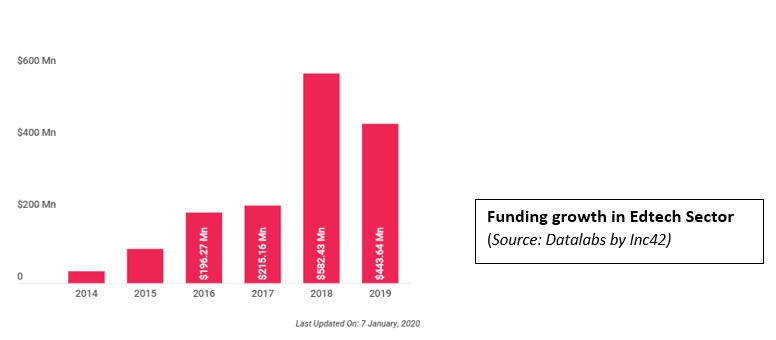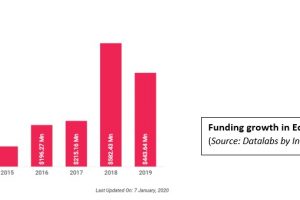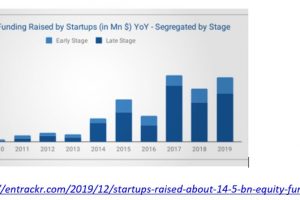Prof. Vikku Agrawal
Abstract
The article discusses about the increasing scope of remunerative investments in the online education sector in India. Despite having a huge potential, the private investors have been wary of investing at the seed stage of edtech start-ups for want of scalability issues. Although the pandemic has left the economy gasping for breadth, online education platforms have grown considerably in the last quarter and so have the investments. This is a precursor to brighter economic prospects.
Introduction
Digitalization has lead to a paradigm shift in all the sectors of business worldwide. It has shrunk the world and has made available far-fetched resources and convenience right up to a customer’s doorstep. It has offered innovative, easy to use and cost-effective solutions to the users’ requirements.
E-learning is one such revolution in the education industry which has found wide acceptance across the teaching and learning fraternity. Edtech has brought in a pool of knowledge within the accessible limits of the learners. It has redefined the ways traditional education is imparted to students. According to a KPMG report in 2017 on Online education in India, the country’s online market is set to grow to USD1.96 billion and around 9.6 million users by 2021 from USD 247 million and 1.6 million users in 2016. This growth estimation coupled with the massive surge in the internet users in India will see online education on an upward trend in the coming future. As per the Internet and Mobile Association of India report of September 2019, there are 471 million internet users in India as of Q1 2019. Another report on internet users in India (https://datareportal.com/reports/digital-2020-india) presents the total number of internet users to be 687 mn as of Jan 2020. It is also known that digitalization in India is not commensurate to the growth its its internet and smart phone users.
So far, majority of the country’s population has looked at education online as a supplement to the traditional education system. Hence, edutech has faced challenges of pricing, scalability and adaptation (Nasscom report, 2017). A report from IBEf in April 2019 on Education and Training is India estimated the education sector in the country to be at 101.1 billion by the end of the year 2019. By virtue of this data, online education currently does not even constitute 2% of the total education system. The unprecendented global crisis due to COVID- 19 has imposed online education as the primary means of educating students and has blissfully increased its scope manifold.
Funding of Edtech startups:
Edtech start-ups play a major role in boosting education online. Investments in this sector have increased 5 times between 2013-2016 and have grown at a CAGR of 33% from 2016 till 2019.
As per the NASSCOM report of 2018, between 2013 and 2017, about 3000 Edtech start- ups have been incorporated in the country. The report also discusses that , over a period of 15 years of this sector, the investors have invariably shown interest in funding the start- ups in their mature stage with more than 40% funding received by the online courses. Like most of the other entrepreneurial set-ups, seed stage and early stage funding has been a challenge . Hence, the equity investors have limited their exposure to the edtech start-ups, possibly considering its adaptation challenges.
The pandemic and the start-up funding
The year 2019 had been the start-ups year with a total equity funding of USD 14.3 billion across 1185 funding rounds. This has been a 25X growth over the year 2010 when the funding raised was $550mn.
The current pandemic has been a game changer for the start-ups in the country. The start-ups across sectors have fallen flat since the onset of the crisis. Data from Venture Intelligence (retrieved through the link https://economictimes.indiatimes.com/small-biz/startups/newsbuzz/what-covid-19-crisis-means-for-indias-startup-funding-ecosystem-in 2020/articleshow/75771891) reveals that Indian startups managed to raise only $354 million across 34 deals in March 2020, down from $714 million secured in February across 46 deals. At $1.74 billion (across 126 deals), startups were at a 22% year-on-year decline in investments for the first quarter of 2020.
During these unprecedented times , the Edtech sector has been the silver lining in the dark clouds. Private equity investors have backed up the Edtech startups by funding the promising ones in the past quarter. The graph of funding edtech start-ups has been on a rise. The data from Traxcn (retrieved throughthe link https://thebluecircle.co/2020/04/23/these-5-edtech-startups-are-redefining-the-indian-education-system/) indicates that the Q1 of the calendar year 2020 saw the Edtech ventures garner USD 686.32 million in 21 funding rounds against 450 million in 87 rounds in 2019. Over 14 start-ups have raised funding from March 2020 out of which 9 of them have received funding at the seed stage. This indicates that the investors are hopeful of the start-ups proving their worth at an early stage due to the increasing demands during pandemic times. The current trends promise a bright future for the sector and for the Indian economy. Byju’s got multiple rounds of funding in 2020 with $200million in Feb 2020 and another one in June 2020 by Bond Capital. Byju’s entry in the club of Indian decacorns after Paytm endorses the scope of funding of the online education start-ups.
Discussion and Conclusion
Amidst the crisis, edtech, against all odds, is amongst that set of businesses which promise positive returns to the economies worldwide. The industry has a huge scope of reaping benefits out of the ‘new normal; the entrepreneurs and the investors alike. The fact that they fulfill a major social responsibility of reaching education to maximum possible individuals in the most cost-effective way increases their growth prospects. Factors like a galloping increase in internet penetration coupled with a high potential of digitalization, compulsory adoption of the alternate ways of education- one of the basic requirements for the students, and the increasing adaptability of the students to online education have offered condusive growth environment to the Edtech start-ups in India. This scope of expansion is a thrust for the start-up ecosystem in India and , at the same time, convinces the investors into continued investments. Private investors in the form of venture capitalists, angel investors PE firms foresee lucrative returns here in the forthcoming years. While the pandemic is not here to stay forever, it would be instrumental in boosting e-learning and making it a practice for the students. At the same time, the increased demand of this sector will attract investments and will support the economy in a big way.
Disclaimer: The views, opinions, and content on this blog are solely those of the authors. ISME does not take responsibility for the content which are plagiarized or not quoted.
References
- Edtech The Advent of Digital Education, Sep 2018, NASSCOM
- Online Education in India: 2021, May 2017, KPMG and Google
- India Internet 2019, IA
MAI and Neilsen - Edication and Training, April 2019, IBEF
- https://inc42.com/features/startup-watchlist-indian-edtech-startups-to-look-out-for-in-2020
- https://www.researchandmarkets.com/reports/4667727/online-education-market-in-india-2018-2023
- https://datareportal.com/reports/digital-2020-inda
- https://entrackr.com/2019/12/startups-raised-about-14-5-bn-equity-funding-in-2019/
- https://thebluecircle.co/2020/04/23/these-5-edtech-startups-are-redefining-the-indian-education-system/
- https://economictimes.indiatimes.com/small-biz/startups/newsbuzz/what-covid-19-crisis-means-for-indias-startup-funding-ecosystem-in-2020/articleshow/75771891






